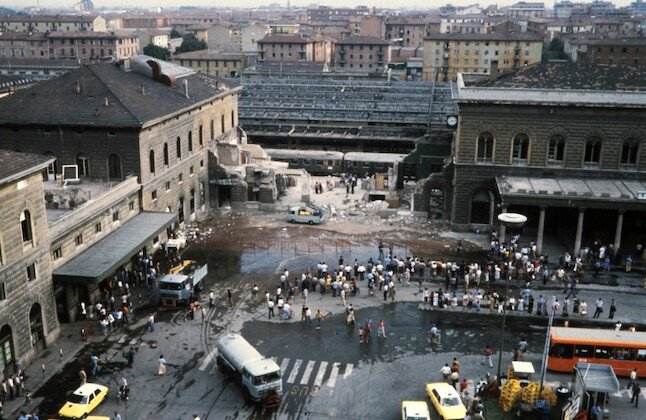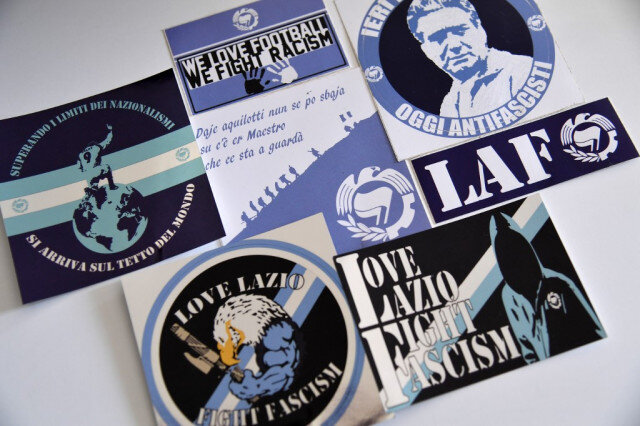Ad Maiora Irriducibili! | Lazio’s Infamous Ultras Group Steps Aside
All across the globe, football seasons are beginning and ending in erratic patterns, as the footballing world scrambles to return to a semblance of normalcy. As uplifting as it has been to see many of the world’s top players competing once again, the unnerving spectacle of watching these matches take place in empty stadiums as counterfeit crowd noise is fed back through our screens has been undeniably difficult to adapt to.
Regardless of the impact that COVID 19 has had on crowd sizes, one set of football fans would not have been returning to the terraces for the 2020/2021 season; well, at least not in their most familiar form.
In February of this year, SS Lazio’s ‘Irriducibili’ announced that they would be disbanding, marking the end of an era for one of European football’s most infamous and influential ultras groups.
History of Irriducibili
For more than thirty years, the ‘Irriducibili’ formed the heart and soul of Lazio’s fan-base, exhorting a level of influence on the club’s direction that most ultra groups could only dream of, as well as, quickly amassing a reputation for being amongst the most violent and politically-charged sets of ultras anywhere in the world.
‘Gli Irriducibili’ were borne out of the ‘Anni di Piombo’ (Years of Lead), a period of unprecedented social and political unrest that arose across Italy during the late 1960s through to the late 1980s. The ‘Years of Lead’ were characterised by incidences of domestic terrorism across the country, perpetrated by warring, far-right and far-left activists. 428 people lost their lives during the conflict, with thousands more scarred both physically and mentally by the senseless violence. This violence served to radicalise many, pitting students, workers, political figures firmly against each other, as Italians clambered to form factions that best represented their own political beliefs.
The aftermath of the bombing of Bologna train station by far-right extremists during the ‘Years of Lead’ | Photo Credit
The Italian football scene was far from immune from this polarisation, as new ultras groups with distinct political leanings sprang up throughout Italy in response to the political chaos that enveloped the country. ‘Gli Irriducibili’ were just one of the ultras groups that were formed during this tumultuous time, by the uniting of SS Lazio fans who shared far-right political beliefs. Indeed, some members of the group have been alleged to have played active roles in carrying out political assassinations during the ‘Anni di Piombo’.
Although the majority of Italians managed to move past the radical ideologies that encapsulated the ‘Years of Lead’ (that is until the recent surge in support for Matteo Salvini’s ‘Lega Nord’ catapulted fervent nationalism back into the Italian political mainstream), ‘Gli Irriducibili’ remained largely steadfast in their determination to use their platform to showcase their own particular brand of xenophobia, anti-semitism, nationalism and eurosceptism.
Irriducibili Right-wing Politics
As recently as 2019, the group paid tribute to Italy’s most infamous fascist, Benito Mussolini, by unveiling a tifo of ‘Il Duce’, in central Milan, while some members openly performed fascist salutes. Over the last few decades, Lazio, as a club, has struggled to disassociate from the Italian dictator, - a cause that has hardly been aided by the behaviour of the ‘Irriducibili, as well as former Lazio player, Paulo Di Canio, inking a tribute Mussolini on his forearm.
Celtic fans criticise Lazio’s links to Mussolini during a Europa League Tie | Photo Credit
Having a controversial ultras group does not make Lazio unique, however, the influence and power that the ‘Irriducibili’ exert over the club, possibly is. In fact, the ‘Irriducibili’ actually managed to arrange a meeting with French legend, Lilian Thuram, during his time at Parma, in an attempt to convince Thuram that he need not worry about the racist chants that all too often reverberated around the Stadio Olimpico, originating from the Irriducibili’s perch in the stadium’s Curva Nord.
In order to understand why the ‘Irriducibili’ have become so synonymous with neo-fascism in Italy, it is necessary to understand the pivotal role played by Fabrizio Piscettelli in the development of the group.
Fabrizio Piscatelli - Diabolik
Piscitelli (nicknamed Diabolik) was a prominent figure in Rome’s gangland scene, serving multiple prison sentences for a variety of offences related to violence and drug-trafficking. Aside from his role as one of the most feared mobsters in Rome, Piscitelli also served as the head of the ‘Irriducibili’ from the early 1990s until his brutal assassination at the hands of a rival gang in August of 2019, while PiscitellI was sat on a bench in one of the city’s most famous parks, ‘Parco degli Acquedotti’ (the park of the aqueducts).
During his reign at the top of the ‘Irriducibili’, Piscitelli molded the group in his image, using the groups as a vehicle to convey his own nationalist, xenophobic and conspiratorial viewpoints - therefore helping to establish Lazio’s nagging association with far-right ideology, setting the tone for decades of controversial TIFOs and chants.
This is an association that has frustrated many Lazio fans, who are dismayed by the persistent portrayal of the club by the media and opposition fans as being fundamentally racist. In 2011, one set of Lazio supporters took on the task of challenging this negative perception of the club through the founding of LAF (Laziale and Anti-Fascist), a new Lazio ultras group aimed at rehabilitating the image of the club and its supporters.
Stickers created by LAF | Photo Credit
The LAF will only have been emboldened by the shock announcement that the ‘Irriducibili’ would be disbanding, with the group citing ‘too much blood, too many banning orders and too many arrests’ as the reason behind the decision, suggesting that the remaining members feared their past actions coming back to haunt them further, just as they had for Piscitelli.
As part of this announcement, the ‘Irriducibili’ clarified that a new ultras group, ‘Ultras Lazio’, will occupy the part of the Curva Nord that Piscitelli and his peers had once made infamous.
To what extent this rebranding marks a radical pivot in the ideology of the group, remains to be seen. In an era of when storied football clubs are bought and sold as commodities by owners, it has become increasingly important for teams to be marketable to investors (just ask Lazio’s rival in the Italian capital or their new Saudi owners), and you could certainly argue that the ‘Irriducibili’ were holding back Lazio from becoming a more desirable brand.
Unfortunately, COVID 19 has prevented football fans from getting a closer look at the behaviour of ‘Ultras Lazio’; however, in the meantime, the dissolution of ‘Gli Irriducibili’ has enabled more progressive Lazio supporters, such as, the founders of ‘LAF’ to dream of a more inclusive future for the club.




